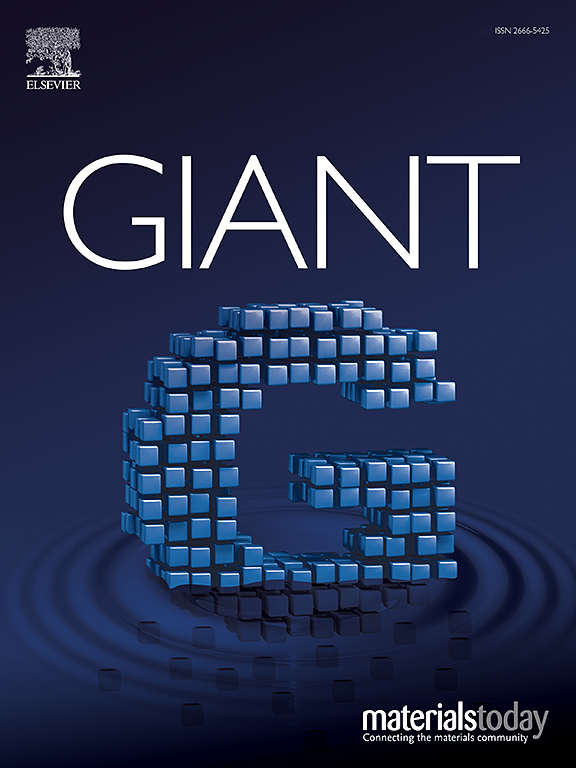具有部分化学可回收性的机械可调三嵌段共聚聚酯的研制
IF 4.9
1区 化学
Q2 CHEMISTRY, MULTIDISCIPLINARY
引用次数: 0
摘要
三嵌段共聚物由于其独特的微相分离结构,可以显著提高材料的性能,已成为发展可持续聚合物的重要候选者。然而,关于可回收的嵌段共聚聚酯的研究报告仍然相对有限。3,4-二氢- 2h -苯并[b][1,4]二氧杂平-2- 1 (BDXO)是由内酯衍生而来的可再生单体,其均聚物具有优异的热性能和拉伸强度,但柔韧性较低。共聚各种环酯并利用其各自的优势进行改性已成为解决这一问题的一种非常有前途的策略。本研究以聚碳酸三亚甲基(PTMC)为软链,聚(3,4-二氢- 2h -苯并[b][1,4]二奥塞宾-2- 1)(PBDXO)为硬链,设计并合成了一种部分化学可回收的三嵌段共聚物。利用质子核磁共振(1H NMR)、尺寸专用色谱(SEC)、基质辅助激光解吸/电离飞行时间质谱(MALDI-TOF MS)、热重分析(TGA)和差示扫描量热法(DSC)对合成的三嵌段共聚聚酯的化学结构、分子量和热性能进行了表征。力学试验结果表明,软段和硬段的比例以及总分子量可以调节共聚酯的机械强度。利用硬段和软段之间的上限温度(Tc)差异,PBDXO硬段可以有效地进行选择性化学回收,而PTMC软段基本上可以保留下来。这为设计可回收的块状共聚聚酯提供了一种方便和可持续的方法。本文章由计算机程序翻译,如有差异,请以英文原文为准。

Development of a mechanically tunable triblock copolyester with partial chemical recyclability
Triblock copolymers can significantly enhance material properties due to their unique microphase separation structures and have become important candidates for the development of sustainable polymers. However, research reports on recyclable block copolyesters remain relatively limited. 3,4-Dihydro-2H-benzo [b][1,4]dioxepin-2-one (BDXO) is a renewable monomer derived from lactones, and its homopolymer exhibits excellent thermal properties and tensile strength but low flexibility. Copolymerizing various cyclic esters and leveraging their respective advantages for modification has emerged as a highly promising strategy to address this issue. In this study, a partially chemically recyclable triblock copolyesters was designed and synthesized using poly(trimethylene carbonate) (PTMC) as the soft chain and poly(3,4-dihydro-2H-benzo[b][1,4]dioxepin-2-one) (PBDXO) as the hard segment. The synthesized triblock copolyesters were characterized for their chemical structure, molecular weight, and thermal properties using proton nuclear magnetic resonance (1H NMR), size exclusive chromatography (SEC), matrix-assisted laser desorption/ionization time-of-flight mass spectrometry (MALDI-TOF MS), thermogravimetric analysis (TGA), and differential scanning calorimetry (DSC). Mechanical tests revealed that the mechanical strength the copolyesters can be tuned by the proportion of the soft and hard segments as well as the total molecular weight. Leveraging the disparity in ceiling temperature (Tc) between the hard and soft segments enables efficient selective chemical recycling of the PBDXO hard segment, with the PTMC soft segment being substantially remained. This offers a facile and sustainable approach to the design of recyclable block copolyesters.
求助全文
通过发布文献求助,成功后即可免费获取论文全文。
去求助
来源期刊

GIANT
Multiple-
CiteScore
8.50
自引率
8.60%
发文量
46
审稿时长
42 days
期刊介绍:
Giant is an interdisciplinary title focusing on fundamental and applied macromolecular science spanning all chemistry, physics, biology, and materials aspects of the field in the broadest sense. Key areas covered include macromolecular chemistry, supramolecular assembly, multiscale and multifunctional materials, organic-inorganic hybrid materials, biophysics, biomimetics and surface science. Core topics range from developments in synthesis, characterisation and assembly towards creating uniformly sized precision macromolecules with tailored properties, to the design and assembly of nanostructured materials in multiple dimensions, and further to the study of smart or living designer materials with tuneable multiscale properties.
 求助内容:
求助内容: 应助结果提醒方式:
应助结果提醒方式:


